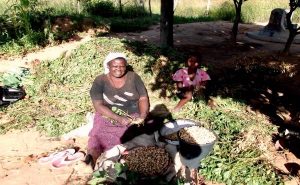
Garden farming improves family health
Green leafy vegetables provide essential vitamins and minerals that are important for a healthy diet. Garden Farming in Makoni has been doing just that. Families involved in the GAIA funded Farmers’ clubs program have been able to address food insecurity and improve the health of families by tackling malnutrition. Throughout the year families that established nutrition gardens have increased their resilience and prevented malnutrition .
Grace Mupoperi , a member of the Mabvazuva garden group has seen the benefits of nutrition gardens on the health of her 6 children “Gardens are a source of nutritious food for my children. I see that they don’t fall sick as often as they used to before I had my own garden. We grow different varieties of vegetables that even give us income as we sell them to others in the community ”
Farmers in the project organised themselves into 24 groups and they join their forces, ideas and resources so that they can further the agricultural production of each member. Families make use of seed sharing and organic manures which produce quality vegetable varieties. This coupled with adopting best farming practices methods such as crop diversification, compost making, mulching and crop rotation farmers are giving their families the much needed nutritional diversity.
Gardening farming not only contributes to household food security but it is also providing extra family income from the sale of surplus produce to the local community. Families with gardens usually produce more than enough for their families and the rest is sold and the income is used for medical expenses, school fees, savings and other home improvements requirements.
The Farmers club program funded by Gaia Movement aims to enhance 1 200 farmers’ resilience to current and future climate related shocks and protect the environment in Makoni district thereby making them food, nutrition and income secure all year round. This organised Farmers’ Clubs allow them to be better prepared against current and future climate change related shocks

